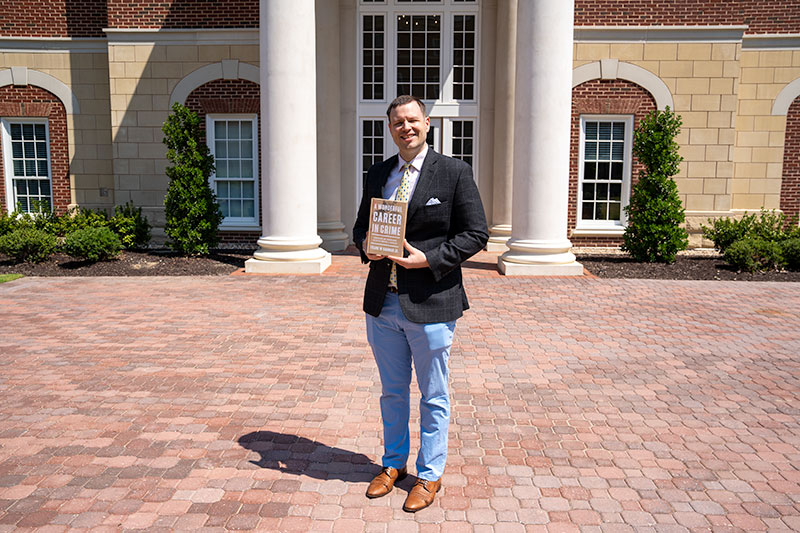
Read time:
When Professor Dr. Frank W. Garmon Jr. asked Nate Hotes, then a senior, to comb through historical records dating back to the Lincoln presidency, he had no idea that the research would yield a gem of a story that would lead to a book.
As he dug deep into Lincoln’s pardon records, Hotes uncovered the name of Charles Cowlam, a career criminal and con artist who turns out to hold a truly unique place in Civil War-era history.
Hotes, ‘21 American Studies and Political Science, started to put the pieces of Cowlam’s life together. He documented that Cowlam had successfully lobbied President Lincoln to pardon him.
Several months later, Garmon, an assistant professor of American Studies, took the research further and discovered that Cowlam had not only been pardoned by Lincoln, but also by Jefferson Davis, president of the Confederate states. He is believed to be the only person pardoned by both leaders, prominent political foes of the time.
After untangling Cowlam’s life of deceit, Garmon decided he was the perfect subject for a book and embarked on telling his sordid story.
In July, Garmon’s book about Cowlam, titled “A Wonderful Career in Crime: Charles Cowlam’s Masquerades in the Civil War Era and Gilded Age,” was published.
The undergraduate research by Hotes not only helped propel Garmon’s efforts to pursue a book about Cowlam, but it also powered Hotes’ quest to go to law school.
“My research at CNU assisted in my career trajectory, providing me with door-opening research and writing experience,” said Hotes, who was awarded a full scholarship to George Mason’s Antonin Scalia Law School. “Multiple potential employers asked me about my research during interviews for summer and full-time employment throughout law school, which surprised me, as it was largely unrelated to the law I would have been practicing.”
Cowlam was a master manipulator who presented himself as someone very different from who he truly was. He had alias after alias, and was able to convince all types of people to trust him.
As the two sides fought during the Civil War, Cowlam captured the attention of the leaders, who were diametrically opposed on the political spectrum.
Cowlam’s tale of forgiveness started when he was in prison in Richmond. The Civil War had just begun. Cowlam was serving a 10-year sentence for robbery after he stole $4,000 from the mail while working as a post office clerk in Portsmouth, Va. His trial took place in Norfolk, Va., and he was convicted. His friends and family petitioned Lincoln on his behalf, noting that he was only 19 when the thefts occurred. Lincoln took mercy on him and issued a pardon on May 27, 1861.
However, Lincoln’s pardon came during a time of great political transition. It arrived just over a month after Virginia had seceded from Union. The governor of Virginia refused to recognize Lincoln’s authority, and Cowlam remained in prison for two more years until he convinced Davis to also grant him a pardon.
“That pardon alone (Lincoln’s) read like snapshot into a story you would read about in the news,” Hotes said. “While you’ll have to read the book to get all the details, the next year of research unearthed evidence that Cowlam was connected to bigamous marriages, crimes across multiple continents and both sides of the Civil War and was partially involved in investigations following Lincoln’s assassination.”
After being pardoned, Cowlam conned his way into working as a detective and even persuaded President Ulysses S. Grant to appoint him as a U.S. marshal. He also launched a congressional campaign of his own in Florida.
When his political prospects failed, Cowlam moved to New York City and became a serial bigamist, marrying half a dozen women within a span of six months. An enterprising attorney exposed the frauds in 1874, at which point Cowlam fled the city and spent the next 12 years on the run. He surfaced again in 1886 in Dayton, Ohio, claiming this time to be a Union colonel who suffered from dementia and could not remember his name.
The title of Garmon’s book is drawn from a quote by a pardon clerk who said that Cowlam had run “a wonderful career in crime for one so young.”
Hotes is thrilled that his research contributed to building the foundation for Garmon’s book. Garmon, he said, had a hugely positive influence on his educational journey and he is excited for his success.
“It has been wonderful to watch my original discovery as a student spiral into many more discoveries and finally a story Dr. Garmon can publish,” Hotes said. “Dr. Garmon was always an amazing mentor and professor, his passion and care for students and his research always came through.”
He believes Cowlam’s story is one that will interest many.
“I hope the book brings a certain amount of perspective and groundedness to history. When people think of the Civil War, they think of the battles, larger-than-life generals, and social movements on a mass scale in a way that makes you forget how many people lived interesting but not publicly advertised lives during that period,” Hotes said. “Charles Cowlam provides a unique chance to follow a figure through a tumultuous time in American history in a way that is not only entertaining, but asks questions people have probably never thought about, such as ‘How did the Union and the Confederacy deal with transferring criminal records? How easy was it to hide one’s identity before electronic record keeping?’ The Civil War will be the backdrop of ‘A Wonderful Career in Crime’ and immerse people in the history and intrigue of one person’s journey.”